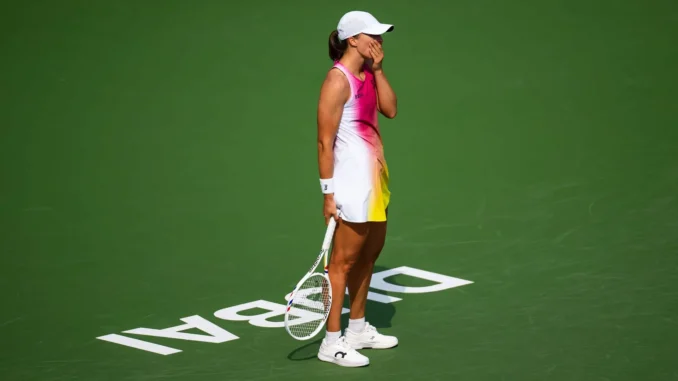
The reverberations of Iga Swiatek’s unexpected exit from the Dubai Duty Free Tennis Championships continue to echo throughout the tennis world, sparking a debate that transcends the mere result of a single match. At the heart of the discussion lies Swiatek’s candid assessment of the WTA calendar, a schedule she argues is excessively demanding, contributing to her recent performance. The question now being posed is whether her complaints are justified, or merely a convenient excuse for an off day.
Swiatek, a player known for her unwavering focus and relentless pursuit of excellence, has been a dominant force in women’s tennis. Her rise to the top has been marked by remarkable consistency and a fierce competitive spirit. However, the Dubai tournament presented a stark contrast to her usual form.
Following her surprising defeat, Swiatek didn’t shy away from addressing the issue that she felt played a significant role. She spoke openly about the toll that the relentless WTA schedule takes on players, highlighting the constant travel, the lack of sufficient rest, and the mental and physical strain of competing week in and week out.
“It’s just too much,” she articulated, her words reflecting a sense of frustration. “We’re constantly on the move, playing in different time zones, and it’s hard to maintain peak performance when you’re constantly fighting against fatigue.”
These comments ignited a widespread discussion, with tennis pundits, fellow players, and fans weighing in on the issue. Some have expressed sympathy for Swiatek’s concerns, acknowledging the grueling nature of the professional tennis circuit. They point to the increasing number of tournaments and the compressed schedule, which leaves little room for recovery.
“She’s not wrong,” one commentator observed. “The demands on these players are immense. They’re not just athletes; they’re also travelers, performers, and public figures. It’s a lot to handle.”
Others, however, have been less sympathetic, arguing that professional athletes are expected to adapt to the demands of their sport. They point to the fact that all players face the same schedule, and that Swiatek’s complaints could be perceived as a lack of resilience.
“Everyone’s tired,” a former player stated. “It’s part of the job. You have to find a way to manage it. Complaining about it won’t change anything.”
The debate also delves into the broader issue of player welfare in professional tennis. The WTA, like other sports organizations, faces the challenge of balancing the commercial interests of the sport with the well-being of its athletes. The need to generate revenue through tournaments and events must be weighed against the potential for player burnout and injury.
Swiatek’s comments have brought renewed attention to the need for a more sustainable schedule, one that prioritizes player health and longevity. Some have suggested implementing longer off-seasons, reducing the number of mandatory tournaments, and providing more support for player recovery.
The timing of Swiatek’s complaints has also been a subject of discussion. Coming immediately after a defeat, some have questioned whether her comments are simply a way to deflect attention from her performance. However, her consistent advocacy for player welfare suggests that her concerns are genuine and not merely a reaction to a single loss.
The issue of mental health is also intertwined with the discussion. The constant pressure to perform, the isolation of travel, and the emotional rollercoaster of competition can take a toll on a player’s mental well-being. Swiatek’s openness about the challenges she faces has helped to destigmatize the discussion of mental health in sports.
Ultimately, the question of whether Swiatek’s complaints are justified is a matter of perspective. Some will see her as a voice for change, advocating for a more humane approach to professional tennis. Others will view her as a player who needs to adapt to the realities of the sport.
Regardless of one’s opinion, Swiatek’s comments have served to highlight the ongoing debate about the demands placed on professional athletes. They have sparked a conversation that is likely to continue, as the tennis world grapples with the challenge of balancing competition with player welfare. The discussion has also brought light to the fact that even the most dominant athletes are still human, and that they need to have their physical and mental health taken into account.
Leave a Reply